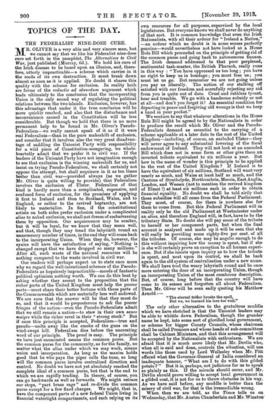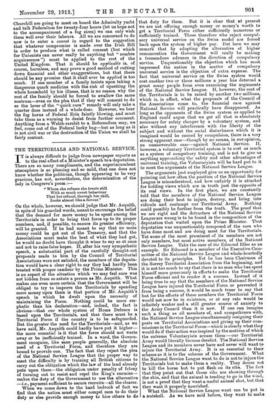TOPICS OF THE DAY.
THE FEDERALIST NINE-DOSE CURE. NIR. OLIVER is a very able and very sincere man, but we cannot say that we like his Federalist nine-dose cure set forth in the pamphlet, The Alternatives to Civil War, just published (Murray, &l.). We hold his cure of the Irish disease to be based upon an illusion, and, there- fore, utterly impracticable—a scheme which carries in it the seeds of its own destruction. It must break down almost as soon as it is applied. No doubt it shares this quality with the scheme for exclusion. In reality both are forms of the reductio ad absurdum argument which leads ultimately to the conclusion that the incorporating Union is the only sound way of regulating the political relations between the two islands. Exclusion, however, has this advantage that under it the true conclusion will be more quickly reached, and also that the disturbance and inconvenience caused in the Constitution will be less considerable. But though we hold that there is no more permanent help to be found in Mr. Oliver's Pseudo- Federalism—We really cannot speak of it as if it were real Federalism—than in the pure makeshift of exclusion, and consider that it involves also the very great disadvan- tage of saddling the Unionist Party with responsibility for a wild piece of Constitution-mongering, we whole- heartedly admit that we prefer it to civil war. If the leaders of the Unionist Party have not imagination enough to see that exclusion is the winning makeshift for us, and insist on trying Pseudo-Federalism, we shall certainly not oppose the attempt, but shall acquiesce in it as ten times better than civil war—provided always (as we gather Mr. Oliver is quiten to provide) that Federalism involves the exclusion of Ulster. Federalism of that kind is hardly more than a complicated, expensive, and confused form of exclusion, for the promises of applying it first to Ireland and then to Scotland, Wales, and to England, or rather to the revived heptarchy, are not likely to materialize. In fine, if the constitutional artists on both sides prefer exclusion under a complicated alias to naked exclusion, we shall not dream of embarrassing them by opposition. Our acquiescence may be sombre, but it will be loyal, for we know that they mean well, and that, though they may tread the labyrinth round an unnecessary number of times, in the end they will come back to the incorporating Union. When they do, however, the cynics will have the satisfaction of saying, " Nothing is changed except that we have dropped so many millions." After all, such waste of the national resources will be nothing compared to the waste involved in civil war.
Our readers will perhaps expect us to state once more why we regard the well-intentioned schemes of the Pseudo- Federalists as hopelessly impracticable—moods of fantastic political optimism nothing worth. We can do this best by asking whether they assent to the proposition that the richer parts of the United Kingdom must help the poorer parts—must share their better fortune with those parts of the Commonwealth which are materially less well endowed. We are sure that the answer will be that they must do so, and that it would be preposterous to ask the poorer fringes of the nation—even the Pseudo-Federalists admit that we still remain a nation—to stew in their own sauce maigre while the richer revel in their " strong stock." But if once this principle is accepted, Federalism—true and pseudo—melts away like the smoke of the guns on the wind-swept hill. Federalism dies before the uncreating word of our principle. The proof is easy. The principle we have just enunciated means the common purse. But the common purse for the community, as for the family, no matter what the alias under which we may work, means union and incorporation. As long as the maxim holds good that he who pays the piper calls the tune, so long will the common purse involve centralized direction and control. No doubt we have not yet absolutely reached the complete ideal of a common purse, but that is the end to which we are rapidly tending. In theory, of course, you can go backwards as well as forwards. We might retrace our steps, "part brass rags" and re-divide the common purse except for a few fixed charges. We might, that is, have the component parts of a new federal Union living in financial watertight compartments, and each relying on its own resources for all purposes, supervised by the local legislatures. But everyone knows we shall never do anything of that sort. It is common knowledge that even the Irish Nationalists, with all their ardour for " Ireland a Nation," —an ardour which no doubt is in some senses perfectly genuine—would nevertheless not have looked at a Home Rule Bill which proceeded on the principle of getting rid of the common purse and going back to autonomous finance.
The Irish demand addressed to that poor perplexed, sentimental task-master, the British Pharaoh, really runs in this way : " You have oppressed us too long ; you have no right to keep us in bondage ; you must free us ; you must let us go. But remember we are not going unless you pay us liberally. The notion of our stalking off satisfied with our freedom and scornfully rejecting any aid from you is quite out of date. Cruel and ruthless tyrant, hear and tremble. We go with a handsome subsidy or not at all—and don't you forget it ! An essential condition for departing in peace and forgiving old wrongs is that we keep a hand in your pocket."
We venture to say that whatever alterations in the Home Rule Bill might be agreed to by the Nationalists in order to produce the result which Mr. Oliver and the Pseudo- Federalists demand as essential to the carrying of a scheme applicable at a later date to the rest of the United Kingdom—including, of course, an excluded Ulster—they will never agree to any substantial lowering of the fiscal endowment of Ireland. They will not look at an amended Bill which does not in some form or other give them an inverted tribute equivalent to six millions a year. But how in the name of wonder is this principle to be applied to the rest of the United Kingdom ? If Ireland is to have the equivalent of six millions, Scotland will want very nearly as much, and Wales at least half as much, and the Cantons of Strathclyde, Northumbria, Mercia, East Anglia, London, and Wessex (not to mention the revived kingdom of Elmet !) at least six millions each in order to obtain financial equality. No doubt we shall be told airily that these subsidies will all come from the Federal Parliament. They must, of course, for there is nowhere else for them to come from. But this Federal Parliament will in reality only be the old Parliament at Westminster under an alias, and therefore England will, in fact, have to be the tributary State. No doubt she will pay some of the tribute to herself or her component parts, but when the final account is analysed and made up it will be seen that she will really be providing some eighty-five per cent. of all the tributes. Of course, she may be angelic enough to do this without inquiring how the money is spent, but if she is she will certainly prove an exception to all human experi- ence. But if she insists upon inquiry as to how the tribute is spent, and next upon its control, we shall be back again to the old system of centralisation under a new name. We shall have trod the weary labyrinth round and be once more entering the door of an incorporating Union, though an incorporating Union of the most cumbrous description. But, of course, long before that the country will have come to its senses and forgotten all about Federalism. Then Mr. Oliver will be seen sadly quoting his Matthew Arnold:—
"The eternal trifler breaks the spell, But we, we learned his lore too well."
The only other alternative to the gratuitous muddle which we have sketched is that the Unionist leaders may be able to whittle down Federalism, though the grander- name be kept, into some sort of glorified local government, or scheme for bigger County Councils, whose chairmen shall be called Premiers and whose heads of sub-committees shall be Cabinet Ministers, and that this arrangement will be accepted by the Nationalists with enthusiasm. We are afraid that it is much more likely that Mr. Devlin who, when all is said and done, controls the situation, will use words like those used by Lord Wellesley when Mr. Pitt offered what the Governor-General of India considered an inadequate honour, "What am I to do with this gilded potato ? " But it is, perhaps, not judicious for us to speak so plainly as this. If the miracle should occur, and Mr. Devlin should prove willing to accept local government in a gilded coat, it is not for us to throw obstacles in his way. As we have said before, any muddle is better than the misery of civil war, for that is the irremediable wrong.
When. then we are told, as the Times tells us on 'Wednesday, that Mr. Austen Chamberlain and Mr. Winston.' Churchill are going to meet on board the Admiralty yacht and talk Federalism for twenty-four hours (let us hope not to the accompaniment of a fog siren) we can only wish them well over their labours. All we are concerned to do now is to enter a caveat in regard to the suggestion that whatever compromise is made over the Irish Bill in order to produce what is called consent (but which for Unionists can never really be anything but " sombre acquiescence ") must be applied to the rest of the United Kingdom. That it should be applicable is, of course, harmless, and may prove a good method of cutting down financial and other exaggerations, but that there should be any promise that it shall ever be applied is too much. If one member of a, family insists upon taking a dangerous quack medicine with the risk of upsetting the whole household by his illness, that is no reason why the rest of the family should be forced to swallow the same nostrum—even on the plea that if they will consent to do so the lover of the "quick cure" remedy will only take a quarter dose instead of a whole dose. However, we hear the fog horns of Federal Erin faintly blowing, and must take them as a warning to desist from further comment. Anything from a Welsh-rarebit to a Referendum may, we feel, come out of the Federal lucky bag—but as long as it is not civil war or the destiuction of the Union we shall be fairly content.



















































 Previous page
Previous page